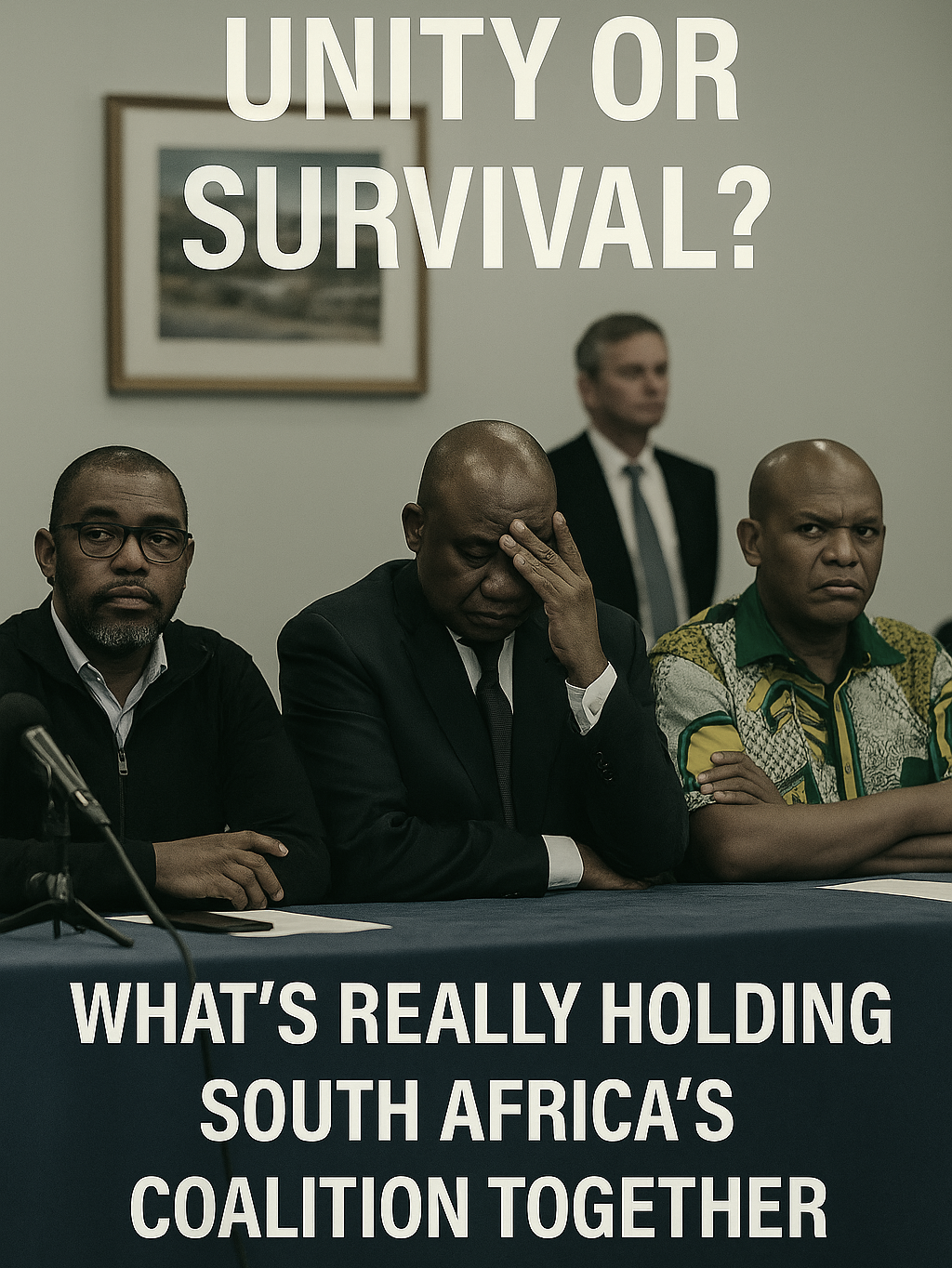Behind Closed Doors: The Secret Deals Keeping South Africa’s Coalition Alive
Inside South Africa’s fragile 2025 coalition: secret side‑deals, ANC‑DA tensions, economic fallout, and whether this multiparty alliance can survive.

JOHANNESBURG, July 3, 2025
A year into its first national coalition, South Africa’s Government of National Unity (GNU) shows a fragile balance of power. This coalition is built not on a common vision but out of political necessity. The ANC's long dominance is now weakened, and ideological divides among coalition partners are deep.
Secret agreements and last-minute concessions define the country’s political scene.
A Shattered Legacy: 2024 Elections and the End of ANC Majority
On May 29, 2024, the ANC reached a turning point by securing only about 41.8% of the votes, down from 57.5% in 2019. These results forced the ANC into talks about forming a coalition. The ANC faced a choice: team up with the DA, EFF, and IFP, or create a minority government. Internal party opposition grew, especially against any deal with the DA, which many supporters still view with distrust as a “white-led” party.
In the end, President Cyril Ramaphosa guided the party toward forming a GNU with the DA, IFP, PA, and later several smaller parties, gaining 287 seats in the 400-seat National Assembly.
The Fragile Framework: Coalition Formation & Power Division
Negotiations concluded late on June 14, 2024, after long sessions between Ramaphosa and DA leader John Steenhuisen. The DA won key cabinet and parliamentary positions, including six ministries, the deputy speakership, and several committees, while the ANC kept 20 cabinet roles.
This unity was maintained through a formal eight-page agreement that required “sufficient consensus” for major decisions. Yet, beneath this carefully maintained surface, serious divisions threatened the alliance.
“The electorate sent a clear message: single-party dominance is over. If we don't respect that, we betray democracy itself.” - John Steenhuisen (Democratic Alliance Leader)
The Budget War: VAT Hike Sparks Coalition Rupture
In early 2025, Finance Minister Enoch Godongwana proposed a 2% VAT increase to cover a R75 billion budget gap. The DA and other coalition partners completely opposed this, postponing the budget vote.
In April, the rand fell to nearly an all-time low of 19.82/$ due in part to coalition uncertainty and concerns over U.S. tariffs. By April 24, the ministry dropped the VAT increase due to pressure from both the DA and ANC factions. This reversal worsened the R75 billion revenue shortfall, highlighting deeper governance tensions.

The Whitfield Firing: DA Ultimatums Shake GNU
On June 26, 2025, Ramaphosa fired DA Deputy Trade Minister Andrew Whitfield over an “unauthorized trip.” Steenhuisen described this as “the biggest mistake in South Africa’s political history” and gave Ramaphosa a 48-hour ultimatum to either reinstate Whitfield or remove ANC ministers accused of corruption.
The DA also pulled out of Ramaphosa’s “national dialogue” but did not fully exit the coalition. As negotiations heated up, the rand saw minor improvements, trading at R17.8550 after a 0.1% gain on June 27. Bond yields increased as investors prepared for political unrest.
Backroom Bargains and Shadow Governance
Insiders report that an eight-member “executive committee” meets weekly behind closed doors, shaping policy before formal Cabinet discussions. Leaks reveal portfolio swaps on state-owned enterprises, judicial appointments, and provincial allocations, which do not appear in official records.
Critics, including former Public Protector Thuli Madonsela, have criticized the coalition as an arrangement of “not principle, but privilege.” This lack of transparency fosters public distrust and complicates parliamentary accountability, raising concerns about a hidden shadow government.
“Coalitions without transparency become a cartel of convenience. Voters deserve clarity, not backroom deals.” - Thuli Madonsela (Former Public Protector)
Ideology vs. Political Convenience
This GNU combines parties with very different platforms:
- ANC: Center-left, focused on the National Health Insurance, social grants, and infrastructure
- DA: Pro-market, against the National Health Insurance, emphasizing fiscal discipline
- EFF: Radical left, advocating for land expropriation and nationalization (excluded)
- IFP/PA and others: Regional and issue-based agendas
- Multi-Party Charter signatories: Create an umbrella for an anti-ANC/EFF coalition
These conflicting goals hint at governance based on arithmetic rather than shared ideology—a mix held together by the need for power-sharing instead of a common vision.

Regional Echoes: Emerging Democracies in Flux
South Africa is not alone in facing these issues. Similar challenges in coalition compromise over principles have emerged in the context of the Russia-Ukraine war. In Kenya, Nigeria, and Malawi, fragile alliances have led to policy deadlock and public disillusionment.
Dr. Emmanuel Bako of the University of Ghana notes that emerging democracies often “test the durability of institutions rather than reinforce them.”
Economic Turbulence: Markets, Confidence & Growth
Political instability is affecting the economy:
- Currency volatility: The rand hit 19.82/$ in April but later rebounded to around 17.8–17.9 as tensions temporarily eased.
- Bond market jitters: Yields on 2035 bonds rose about 12 basis points to 10.08% following the Whitfield firing.
- Business sentiment: The RMB/Bureau survey indicated business confidence fell to 40%, citing tariffs and logistical issues.
- Fiscal health: Budget deficits are projected to reach 4.8% of GDP, with credit analysts warning that without coalition stability, credit upgrades are at risk, and debt could escalate.
Ongoing indecision over reforms, from opposing the National Health Insurance to energy policies, is stalling investment and delaying infrastructure improvements.
Wandile Sihlobo (Chief Economist, Agricultural Business Chamber of SA) quoted, “Policy paralysis is the greatest threat. Investors can survive volatility, but they flee from indecision.”
Service Delivery & Public Trust: The Human Cost
Afrobarometer and local polling show government trust is below 35%, as citizens face water shortages, unreliable electricity, and delayed social grants. In Gauteng's urban centers, Spaza shop owners, clinic patients, and students feel the impact of political stagnation.
Protests in Cape Town, Durban, and rural Limpopo are demanding “coalition action now,” reflecting growing public frustration with the political elite.

Key Power Brokers: Personalities That Defined the GNU
- Cyril Ramaphosa (ANC President): A cautious bridge-builder focused on maintaining order while balancing internal and external reformist pressures.
- John Steenhuisen (DA leader): Firm on accountability. His ultimatum over Whitfield indicated that the DA aims to be a decisive coalition player, not a quiet ally.
- Enoch Godongwana (ANC Finance Minister): A fiscal strategist whose VAT proposal triggered the coalition split.
- Andrew Whitfield (DA Deputy Minister): Represents the DA’s coalition influence; his dismissal prompted a significant conflict.
- Fikile Mbalula (ANC Secretary-General): Pragmatic about the coalition while cautioning against compromising the ANC’s values.
What Happens Next?
2026 Municipal Elections: If the DA performs well, it could reshape alliances and spark national renegotiations.
Budget Legislation: The finance minister will likely present a third version of the budget, possibly with more cuts or tapping contingency funds.
Ongoing Ultimatum Watch: The DA is monitoring the ANC's corruption probe and could initiate a vote of no confidence if unresolved.
Without formal legal support for coalitions, this GNU continues as a loose political arrangement—its future dependent on each forthcoming vote and portfolio conflict.

Is This Just a Staccato of Survival?
South Africa’s GNU operates within a framework of shaky consensus, with government sustained by power-sharing deals rather than shared ideology. While it has maintained basic governance and avoided collapse, its strength is tested every day through resignations, cabinet changes, and economic shocks.
If transparency, clarity in policy, and public trust do not improve, the GNU risks becoming a dysfunctional alliance of convenience, jeopardizing both governance and democratic credibility.
Debate the Future: Can Coalition Politics Deliver Real Reform?
Can South Africa’s multiparty coalition develop into a stable ideological alignment, or will it stay a fragile mix prone to collapse at each policy crossroads?
Sources
- Reuters was the primary source for real-time political updates, economic data (rand fluctuations, bond yields), VAT policy debates, coalition talks, and quotes from DA and ANC leaders. (www.reuters.com)
- Al Jazeera provided key insights into the Government of National Unity (GNU) structure, policy tensions, and DA’s influence in cabinet decisions. (www.aljazeera.com)
- Wikipedia entries were referenced for factual timelines, 2024 election results, party ideologies, and profiles of political figures like Cyril Ramaphosa, John Steenhuisen, and Enoch Godongwana. (en.wikipedia.org)
- The Christian Science Monitor and France 24 were used for high-resolution images showing coalition sessions, parliamentary action, and civil society response. (www.csmonitor.com, www.france24.com)
- Bloomberg supported macroeconomic analysis related to market reactions, business confidence, and investor outlook during coalition instability.
(www.bloomberg.com) - Quotes are verified public statements, press briefings, or published interviews in Reuters, Al Jazeera, Bloomberg, Wikipedia profiles, and credible op-eds by figures like Cyril Ramaphosa, John Steenhuisen, Thuli Madonsela, Fikile Mbalula, Wandile Sihlobo, and Busisiwe Mavuso across trusted South African and international media platforms.
- Afrobarometer polling data informed the section on public trust and service delivery impact, offering statistical insights into governance perception.
- All images were sourced from official news outlets: Reuters, Bloomberg, France 24, and Christian Science Monitor.




